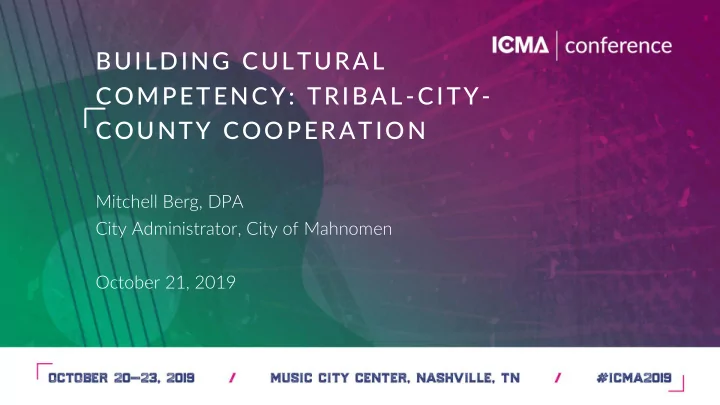

BUILDING CULTURAL COMPETENCY: TRIBAL-CITY- COUNTY COOPERATION Mitchell Berg, DPA City Administrator, City of Mahnomen October 21, 2019
Outline • Why is tribal, county, and municipal cooperation important? ➤ Why is this important? ➤ Why is being culturally competent so important? • How do you promote and sustain tribal, city, and county relations? • What are the tools needed to achieve a successful intergovernmental agreement?
WHY IS TRIBAL, COUNTY, AND MUNICIPAL COOPERATION IMPORTANT? .
Tribal-City-County cooperation is increasingly relevant because: Federal and state devolution is pushing more responsibility to tribes, counties, and cites • Wicked-problems do not adhere to strict geo-political boundaries • Limited financial and staffing resources are making it often forcing tribes, counties, and cities in • having to do more-with-less The cost of litigation is never a win-win •
Why is demonstrating cultural competency important: Learning as much as you can about the culture, history, and rights of the tribe you will be working • with can help you deepen the level of trust with the tribes within your area. Just because some tribes share similar cultures and customs, do not assume all of tribes • that you work with are the same. How can you demonstrate cultural competency between the tribes, counties, and cities in your • area?
HOW DO YOU PROMOTE AND SUSTAIN TRIBAL, CITY, AND COUNTY RELATIONS? .
Trust was the only variable in the research which lead tribes, county, and municipal leaders to want to promote cooperation: Definition of trust: • Firm belief in the character, strength, or truth of someone or something He/she placed • his/her trust in me. 2 : a person or thing in which confidence is placed. 3 : confident hope I waited in trust of their return. 4 : a property interest held by one person or organization (as a bank) for the benefit of another. How do you build trust with other individuals and groups? •
W H A T A R E T H E T O O L S N E E D E D T O A C H I E V E A S U C C E S S F U L I N T E R G O V E R N M E N T A L A G R E E M E N T ? .
Trust, respect, and interpersonal ties were the only variable in the research which lead tribes, city, and county leaders to achieve a successful intergovernmental agreement: Examples of respect: • Be able to follow through on what you promise (commit to what you say) • Be an active communicator and listener • Be intentional and reciprocal • Example of interpersonal ties: • Create informal and formal opportunities for engagement •
intergovernmental cooperation • Meaningful and reciprocal communication and dialogue between the parties is essential to building trust and respect • Opportunities to engage face-to-face helps to promote trust and respect – i.e. when both groups are permitted to have an equal voice and “ equal ” seat at the table • Cultural competency is essential to building trust and respect. Commit towards learning. • Leverage partners who can help you build trust and respect
So what are the take a-ways Establishing an intergovernmental working group is a low-cost solution to building • trust and respect. If creating an intergovernmental working group does is not feasible, initiate • contact and build a relationship with the tribal executive director or tribal department head. If there is not a lot of history with the tribe, begin with focusing on a small-win to • build and earn the trust between you and the tribe. Commit to being culturally competent. Commit to learning more about the • culture, history, and rights of the tribe.
THANK YOU Questions?
Recommend
More recommend